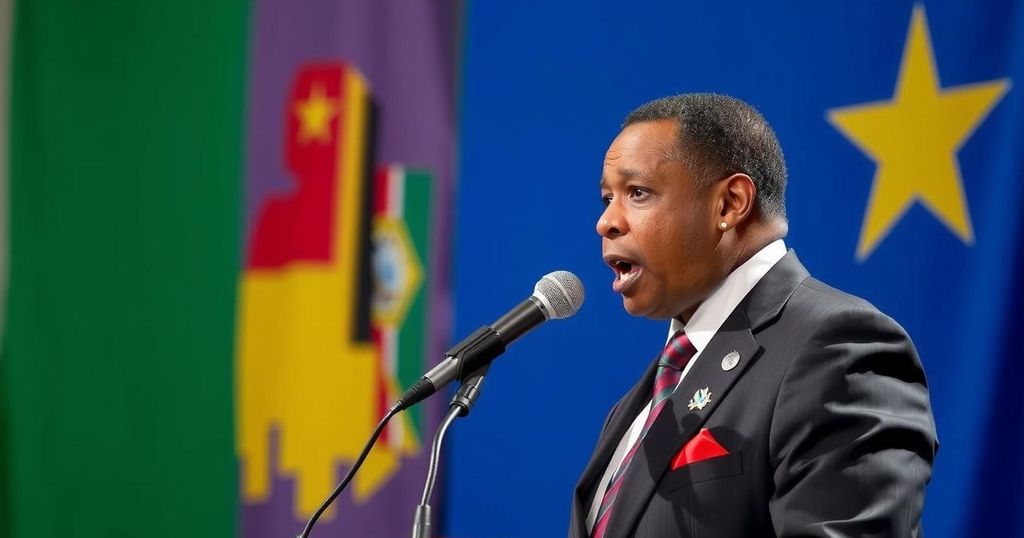Mauritius Prime Minister Acknowledges Election Defeat as Opposition Gains Power
Mauritius Prime Minister Pravind Jugnauth admitted to a significant electoral defeat, suggesting a transition of power to opposition leader Navin Ramgoolam. Despite delays, preliminary indications suggest Ramgoolam may become prime minister for a third time. The election was complicated by a wiretapping scandal and public concerns regarding governance and the economy, emphasizing the challenges ahead for the new administration.
Mauritius Prime Minister Pravind Jugnauth acknowledged on Monday a significant electoral defeat for his coalition during contentious legislative elections, thereby facilitating a transition of power to the opposition. Although final results from Sunday’s voting are pending, opposition leader Navin Ramgoolam appears poised to assume the role of prime minister for the third time, leading his Alliance of Change coalition.
Jugnauth expressed, “The people have chosen another team to lead the country,” reaffirming his commitment to respect the electoral choice made by the populace. As counting delays were reported due to electoral incidents, announcements regarding the final tally are expected later today. Predictably, the winner-takes-all electoral framework often enables singular coalitions to dominate the 70-seat National Assembly, with 62 seats contested in this election.
Just a month ago, Jugnauth celebrated a landmark agreement with Britain over regaining sovereignty of the Chagos Islands after prolonged disputes. Having been prime minister since 2017, he sought to present himself as a figure of continuity amidst suggested governmental reforms. However, the election was marred by a significant wiretapping scandal involving leaked recordings of various prominent figures, which culminated in authorities imposing a temporary social media ban prior to the vote.
Both political factions had pledged to address the pressing economic challenges confronting Mauritians amid ongoing growth. The Alliance of Change manifesto proposed initiatives including a fund to assist struggling families, pension increases, fuel price reductions, and a commitment to combat corruption while fostering a green economy. Furthermore, they advocated for reforms pertaining to the presidential and parliamentary selection processes.
Both Jugnauth and Ramgoolam hail from influential political families that have long shaped Mauritian governance since independence in 1968. Ramgoolam, aged 77, is the progeny of Mauritius’ first prime minister and had previously served in that capacity on two occasions, between 1995-2000 and 2005-2014. On the eve of the election, he expressed confidence in his coalition’s prospects and stated, “We are heading towards a big victory tomorrow. The people are waiting for this liberation.” Despite some concerns regarding electoral integrity, voting proceeded largely without significant disruptions.
Mauritius has enjoyed considerable stability and economic growth since achieving independence, largely driven by tourism and financial services. In 2022, the Gross Domestic Product per capita exceeded $10,000. Nevertheless, increasing apprehension regarding corruption and governmental governance has been noted. The island continues to attract millions of tourists annually, celebrated for its natural beauty, while the Chagos Islands’ sovereignty deal was regarded as a key milestone in the nation’s decolonization journey.
The recent legislative elections in Mauritius were marked by significant tension and anticipation, culminating in a pivotal moment for the nation’s political landscape. The Prime Minister’s acceptance of defeat signals a potential shift in governance and public sentiment towards the opposition. This electoral contest is crucial in understanding the broader implications for Mauritius, a country known for its relative stability and democratic practices. The conditions leading up to the election, including past scandals and public sentiments regarding economic challenges, add layers of complexity to this political transition.
In conclusion, the concession by Prime Minister Pravind Jugnauth indicates a definitive electoral shift in Mauritius, paving the way for opposition leader Navin Ramgoolam to reclaim power. The electoral process, marred by controversies such as the wiretapping scandal, underscores the complexities governing Mauritian democracy. The developments highlight pressing economic considerations for the populace while pointing to the enduring legacy of political dynasties that have shaped the nation’s governance since its independence.
Original Source: www.bellevueheraldleader.com




Post Comment